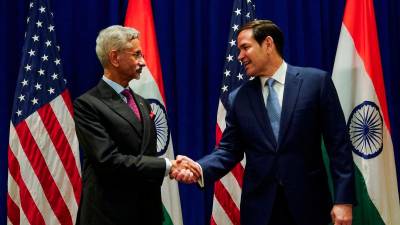NEW YORK: Indian Foreign Minister Subrahmanyam Jaishankar stated that he and United States Secretary of State Marco Rubio agreed on the importance of sustained engagement to advance progress in priority areas during their Monday meeting.
The meeting occurred on the sidelines of the United Nations General Assembly following President Donald Trump’s decision to impose a $100,000 fee for new H-1B visas.
This visa fee represents the latest challenge to United States-India relations, which both nations have worked to strengthen due to shared concerns about China.
Jaishankar posted on social media platform X that they discussed bilateral and international issues of mutual concern.
He added that they “Agreed on the importance of sustained engagement to progress on priority areas.”
Monday’s discussion marked the first encounter between Rubio and Jaishankar since Trump imposed extra tariffs on India for its purchases of Russian oil.
Their previous meeting took place in July during a gathering of the Quad grouping, which includes Japan and Australia.
Bilateral ties have faced strain from ongoing trade frictions, though relations had appeared to be improving before Trump’s visa announcement last Friday.
Analysts indicate the new visa fee will significantly raise operating costs for Indian information technology services companies.
India was the largest beneficiary of H-1B visas last year, accounting for 71% of approved visas according to United States government data.
China ranked a distant second with just 11.7% of approved H-1B visas during the same period.
Indian equity benchmarks declined on Monday as key information technology stocks lost approximately $10 billion in combined market capitalisation following the United States visa announcement.
Rubio has consistently emphasised the importance of maintaining strong ties with India.
He made a surprise appearance at a hearing this month to introduce Sergio Gor, Trump’s nominee for the next United States ambassador to New Delhi.
Rubio described India as “one of the top relationships the United States has in the world today.” – Reuters
